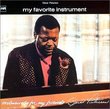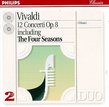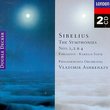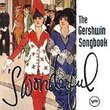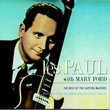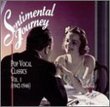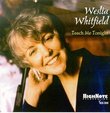| All Artists: Hector Berlioz, Colin Davis, English Chamber Orchestra, Goldsbrough Orchestra, Anne Pashley, John Cameron, Edgar Fleet, John Frost, Elsie Morison, Peter Pears, Joseph Rouleau Title: Berlioz: L'Enfance Du Christ Members Wishing: 0 Total Copies: 0 Label: Decca Release Date: 6/10/1997 Genres: Pop, Classical Styles: Vocal Pop, Opera & Classical Vocal, Forms & Genres, Ballads Number of Discs: 2 SwapaCD Credits: 2 UPC: 028944346121 |
Search - Hector Berlioz, Colin Davis, English Chamber Orchestra :: Berlioz: L'Enfance Du Christ
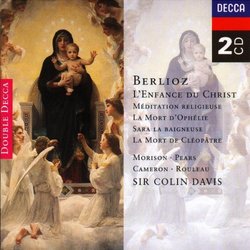 | Hector Berlioz, Colin Davis, English Chamber Orchestra Berlioz: L'Enfance Du Christ Genres: Pop, Classical
|
Larger Image |
CD DetailsSimilarly Requested CDs
|
CD ReviewsA note on 'La Mort de Cleopatre', above all else... Stephen Lagan | Atlanta, GA | 08/17/2001 (5 out of 5 stars) "The price alone makes this disc more than competitive with the best of any such performances, containing as it does highly enjoyable performances of each of these presented works. For those lured to this disc primarily by 'L'enface du Christ', however, I feel special atteniton must be made instead for the performance of 'La Mort de Cleopatre', which I feel for most people would tend to get overshadowed by the larger work. For indeed, 'Cleopatre' is a masterpiece. Long viewed as something of a hidden gem by both singers, conductors, and connoiseurs alike, the work is today enjoying increased popularity due to the sudden influx of star mezzo-sopranos. Indeed, today it has become a valued and featured staple in the concert repertory of Anne Sofie Von Otter, Olga Borodina, Ewa Podles, Jennifer Larmore, Michelle DeYoung and Vesselina Kasarova. And this really isn't surprising, considering that one hearing of the work reveals a composition so absolutely ripe with opportunities for a singer with a flair for the intense and a taste for the visceral to really sink her teeth into. Regarding this cd... unlike most other performances of this work, this recording features a definite soprano, Anne Pashley, over the more common mezzo. And fortunately, the lack of a chest register as imposing as those found in most of the mezzos, as well as the sopranos-with-decided-mezzo capabilities who are her recording counterparts (Jessye Norman, Rosalind Plowright), is a barely noticeable factor in Ms. Pashleys performance here. And the presence of a singer capable of cresting the summits of the soprano top notes that ARE contained in the work (which many a mezzo must desperately lunge for) is a definite advantage. Compare Pashley's attack on the phrases 'fille de Tolomei' or 'm'elencai triomphante' to that of Tourel or the later Baker. Both of the latter are so wonderful in their searingly intense ways, and if Ms. Pashley misses the extra degree of intensity found (and made famous) by these women, it is not by much, and here there is no tentative approach to these notes. But anybody who listens to any recording of this work is to be rewarded. And indeed, Janet Baker (especially the earlier recording, in my opinion, in which the top was fearless), Yvonne Minton, Jessye Norman (twice, like Baker), Jennie Tourel, Beatrice Uria-Monzon, Dunja Vejovich, and Rosalind Plowright have each brought their own special gifts to this searing and profound work on disc. There is also a live performance of the work readily available on the internet by another definite soprano, Veronique Gens, which is incredible. Ms. Gens is absolutely superb, and the feeling of a live performance only enhances things. Seek this out, if you can. But do not hesitate regarding anything involving this work- its attributes are innumerable and more than speak for themself." Berlioz the Antiquarian? Karl Henning | Boston, MA | 03/07/2003 (5 out of 5 stars) "In his Memoirs, Berlioz (almost casually) speaks to the effect of L'enfance enjoying such a spontaneous success, as to insult his earlier compositions. It is such a restrained, contemplative work -- and this seems so unusual in Berlioz -- that it almost sounds a backhanded compliment, to find that it was Brahms' favorite Berlioz score. But if we disregard comparisons like, it's much more intimate in focus than Les Troyens, it is emotionally muted compared to Romeo & Juliet, hardly anything happens in comparison to Faust -- and take the piece on its own terms, we find a beautiful mid-nineteenth-century French answer to the Bach Cantata, a piece which is simply a delight to the ear. It is the gentlest of musical jokes, that the overture to "The Flight to Egypt" begins with fugal writing (for "fugue" comes from the Latin for "flight"); but the fact is that Berlioz wrote a number of fughetto passages in the instrumental sections of this masterpiece, which seems to me to magnify the homage aspect of the work; perhaps it is the Berlioz equivalent of Brahms' (more thorough and studied, perhaps) explorations of "early music." Typically of Berlioz, for despite his fame for bombast and grand gesture he always had a marvelous ear for delicate textures, one of the piece's most striking moments is a trio for two flutes and harp. We love this recording." Best Available Recording Anne L. Duke | Las Vegas, NV USA | 07/31/2001 (5 out of 5 stars) "This is the best available recording to my mind of L'Enfance. Peter Pears is terrific and the choir is excellent as has been noted earlier. Anne Pashley rivals Minton and Baker (my favorite) as Cleopatre, although I rank Bernstein's the most exciting (I forget the soloist). Do not hesitate to buy this although if it's really cheap you want the Naxos account is surprisingly good. I must note however that [...] L'Enfance du Christ is NOT a cello concerto."
|

 Track Listings (11) - Disc #1
Track Listings (11) - Disc #1